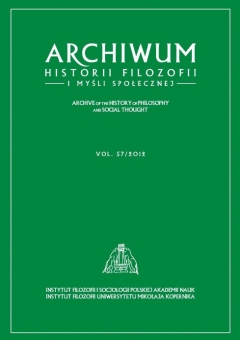O stosunku Augustyna do filozoifii
On Augustine’s Attitude towards Philosophy
Author(s): Rafał ToczkoSubject(s): Epistemology, Ethics / Practical Philosophy
Published by: Instytut Filozofii i Socjologii Polskiej Akademii Nauk
Keywords: Augustine; Cassiciacum; pelagianism; platonism; Porphyrios; metaphilosophy;
Summary/Abstract: This paper treats about Augustine’s definitions and reflections on philosophy. It proves that there occurred a major shift in Augustine’s understanding of philosophy both in the field of epistemology and ethics. Author presents chronology of these changes, that takes into account not only strictly philosophical writings, but later works as well, especially these dedicated to polemics with Pelagius. Early Augustine understood philosophy as a domain of actions of ratio. Philosophy was – in Cassiciacum – a method of getting to grips with the eternal truths, different than simple faith, but one that leads to God just as well. Its advantage is that it enables one to reach full insight into the true reality. At this stage he believes that any man trained in artes liberales can achieve intellectus Dei and reach perfect happiness. These views ceased to be repeated by Augustine already in the last decade of 5th century and later on. The optimistic view on ratio and philosophical way of life was shadowed by a more complicated nucleus of ideas, known as the theory of grace. Author discusses also G. Catapano’s thoughts on a shift in Augustine’s attitude towards philosophers, even those from the school of Plato.
Journal: Archiwum Historii Filozofii i Myśli Społecznej
- Issue Year: 2012
- Issue No: 57
- Page Range: 65-82
- Page Count: 18
- Language: Polish

